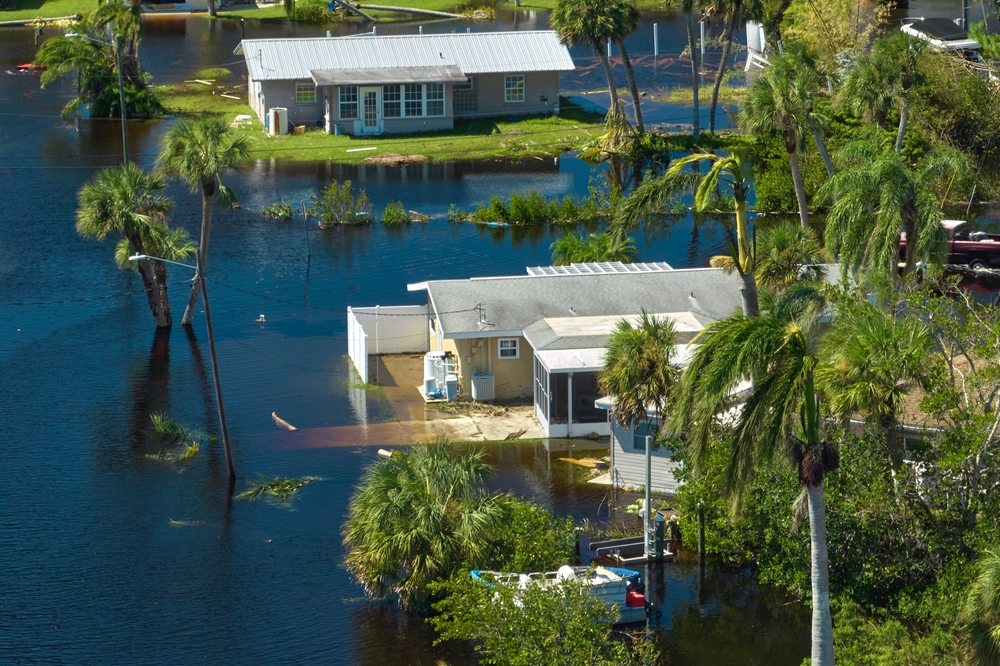Climate change is driving more frequent and intense storms, droughts and floods – causing insurers to pull out of entire areas. Yet that hasn’t stopped them from underwriting and investing in fossil fuels that destabilize the environment.
A new report puts a finer point on it: The world’s insurance companies are complicit in damage to climate, nature, and human health and rights.
Most insurers continue to underwrite businesses with negative social or environmental impacts, such as fossil fuel production or deforestation, and most continue to invest parts of their portfolios in similarly destructive sectors, according to a new report from UK-based nonprofit ShareAction.
“The exceptional has become the new normal, and insurers are now on the front line of the worst impacts of a warming and unstable planet,” the report says. Yet the insurance industry “profits in the short-term from activity, such as fossil fuel extraction, that will ultimately raise its costs and eventually undermine its ability to exist. This has to stop.”
Insurers must shift their focus, ShareAction urges, towards supporting climate solutions, restoring ecosystems, improving working conditions and supporting advances in public health.
The report ranks the world’s largest insurance companies according to several categories, including the investment policies and practices of 23 of the largest life and health insurers, the underwriting approach of 13 of Lloyd’s of London’s largest managing agents, and both investment and underwriting among 29 of the largest property and casualty insurers.
In property and casualty, US insurers Nationwide Mutual Insurance, Liberty Mutual and Travelers ranked near the bottom. European insurance firms scored better, with AXA, Allianz and Aviva scoring ‘B’ grades.
In the life and health category, France’s CNP Assurances, UK-based Legal & General, and Japan’s Nippon Life ranked highest, while US-based Protective Health and Northwestern Mutual were among the bottom performers.
An uninsurable future
ShareAction’s report comes amidst a worsening backdrop for US property insurers who face greater climate risk. “We are marching toward an uninsurable future because we are not acting aggressively enough to reduce greenhouse gas emissions,” former California insurance commissioner David Jones said in a recent ImpactAlpha interview. Jones, one of the first regulators to ask companies to model their climate risk, pointed to data that suggests US insurers hold some $536 billion in investments in fossil fuels.
One glimmer of hope: pension funds and insurers have been increasing impact funding, as a recent Global Impact Investing Network’s survey revealed. “The transition to impact investment managers suggests a growing appetite for more active approaches to generate impact on issues that matter to pensioners or insurance clients,” the group said at the time.
There’s certainly room for improvement. Among ShareAction’s key findings: less than half of insurers have long-term net-zero targets for underwriting, and just one-quarter are aligned with 1.5C. Less than a quarter of insurers have published a transition plan covering their investment and/or underwriting activities.
Meanwhile, only about one-quarter of respondents are taking any steps to manage biodiversity-related risk, and less than half have any biodiversity-related requirements for underwriting or investing in sectors facing the most critical biodiversity-related risks.
In the social sphere, almost no respondents reported engaging with their clients on human and labor rights impacts, and most had no social-related underwriting restrictions. And they rarely consider Indigenous peoples’ and local community rights in their policies.
“The insurance sector needs to fundamentally change if it is to play the role both people and planet need to mitigate against the increasing dangers of climate change, biodiversity loss and social inequality,” the report’s authors write. They include 32 recommendations for the industry to that end.











